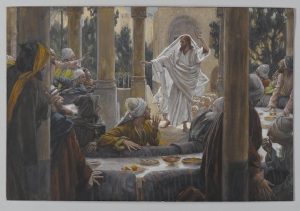HOMILY LENT WEEK 04 04 – Year II
Faith in Jesus and his Gift of Life
(Ex 32:7-14; Ps 106; Jn 5:18, 31-47)
*******************************************
How strong is your faith? Is the Word of God dwelling in you? Are you enjoying eternal life, here and now?
The invitation that comes to us from the readings today is to believe in Jesus, abide in his Word and enjoy eternal life.
The readings, ironically, show us the exact opposite of that message – Infidelity in the Old Testament and unbelief in the New provide the backdrop for this message from today’s readings.
In the first reading, God reacts to the infidelity of the Chosen people, who even before Moses descended the mountain with the Ten Commandments, had fallen into idolatry, worshipping a golden calf of their own making. That calf represents the false gods of possessions, prestige, power and pleasure that still beset us today.
That situation sets up a very interesting scene in which Moses pleads with God, reminds God of God’s innate nature and succeeds in changing God’s mind. Richard Rohr claims “the wonderful thing about Jewish Scriptures is that they present God as relational, able to be influenced and changed, a God of give and take, which becomes the ‘personal’ notion of God we have in Judea-Christianity to this day. It lays the ground for love, freedom, and actual relationship, instead of just fate, unchangeable law and inevitability. The secret of biblical prayer is always to expect God to be true to God’s own name, identity and patterns of goodness in the past, and not just begging God to conform to our immediate ego needs. Prayer, more than anything, seeks, creates and preserves relationship – which is always both giving and receiving. Here is it mostly receiving.”
 In the gospel, Jesus runs into the stubborn unbelief of the Jewish leaders, the very ones who should have welcomed with open arms, as they knew the scriptures best, including the prophecies that were all about him. How they could have missed the message of all those prophecies continues to baffle me. That mystery has become even more evident during the Lenten Missions I have been conducting which include the use of biblical art. One evening is given over to exploring the deeper meaning of Good Friday, through a painting of Psalm 22 by the late Fr. Seiger Köder. It is striking how precisely that psalm, written centuries before the time of Jesus, describes his death on the cross. It is the same with every other prophecy about Jesus – they were all fulfilled in him. Yet even when Jesus points out that the scriptures are all about him, those leaders refuse to come to him for life.
In the gospel, Jesus runs into the stubborn unbelief of the Jewish leaders, the very ones who should have welcomed with open arms, as they knew the scriptures best, including the prophecies that were all about him. How they could have missed the message of all those prophecies continues to baffle me. That mystery has become even more evident during the Lenten Missions I have been conducting which include the use of biblical art. One evening is given over to exploring the deeper meaning of Good Friday, through a painting of Psalm 22 by the late Fr. Seiger Köder. It is striking how precisely that psalm, written centuries before the time of Jesus, describes his death on the cross. It is the same with every other prophecy about Jesus – they were all fulfilled in him. Yet even when Jesus points out that the scriptures are all about him, those leaders refuse to come to him for life.
French philosopher René Girard points out a reason for that blindness – they are caught up in what he calls “mimetic rivalry,” the human world of comparison, competition and imitation. Rohr claims that “inside that blind and incestuous loop of mutual approval and back scratching, God can never be found. There, mass consciousness and group pressure substitute for any real encounter with the Holy. Jesus reveals to these Jewish leaders their unwillingness to make honest use of their own witnesses and internal evidence.” They are too mired in their self-serving mindset, their false pride, unbelief and hypocrisy to change – and so they remain stuck in their fear and hostility. They refuse to come to Jesus for life, even when Jesus states he came to save them.
The message here for us is to not settle for anything less than complete trust in Jesus Christ, allowing his Word to dwell within us especially through contemplative prayer, come to him for eternal life, and in that way, live in his kingdom here and now.
Here is a little poem to stir our faith and trust in God:
As children bring their broken toys with tears for us to mend,
I brought my broken dreams to God because He was my friend.
But then instead of leaving Him in peace to work alone,
I hung around and tried to help with ways that were my own.
At last I snatched them back and cried, “How can You be so slow?”
“My child,” He said, “What could I do? You never did let go.”
The Eucharist is an act of faith in the Word made flesh, broken and shared with us, and source of that eternal life only Jesus can give us. Let us pray for an always deeper faith in Jesus and his Word, and daily turn to him for life, eternal life here and now.



